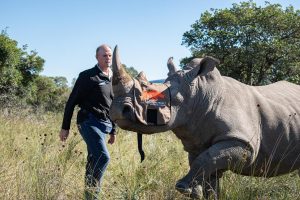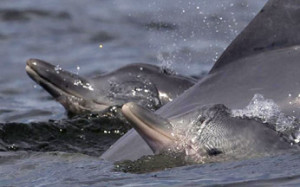It is perhaps fitting that invasive hippos, with their “hungry, hungry” reputations, would be the lasting legacy of one of the world’s most notorious drug lords. Colombia’s Pablo Escobar built an empire on cocaine that made him one of the richest, and most feared, people in the world.
His organization was responsible for an estimated 7,000 deaths and nearly toppled the democratic government of Colombia through assassinations, bribes, and intimidation. But in addition to the violence and drugs, Escobar was a self-styled Robin Hood, sponsoring soccer teams and giving handouts to poor communities.
One of those “benefits” was the invitation for locals to visit his private zoo, which Escobar built in the early 1980s on his leafy ranch Hacienda Napoles, about halfway between Medellin and Bogota.
Escobar was shot dead in 1993, and now Hacienda Napoles is run by the very government he essentially tried to overthrow, as a park and tourist attraction. Most of the exotic animals that had been housed there were transferred to other facilities around the world, but not the hippos.
Natives of Africa, three females and one male hippo were left to their own devices in the ranch’s pond. With mild weather and no competition, the hippos thrived. Over time, some of the animals began to venture away from the pond, into nearby rivers and the surrounding areas. Villagers grew concerned about the large animals, which have a reputation for being dangerous.
A documentary was made about Pablo’s hippos in 2010. With public pressure mounting, the government began castrating some of the animals, in an attempt to stem their spread.
Jonathan Shurin, a biologist with the University of California-San Diego, says there have been “a lot of conflicting stories about the hippos and their spread.”
More studies are needed, says Shurin, who studies wildlife in Colombia and is seeking funding to research the hippos.
To learn more about Pablo’s hippos, we spoke with David Echeverri, a researcher with the Colombian government environmental agency Cornare, which is overseeing management of the animals.
How many hippos are living in Colombia now? How far have they spread?
In the lake at the Hacienda Napoles there are between 26 and 28 hippos. There, they find food, water, and tranquility.
We also have evidence that small groups of hippos or solitary individuals have migrated through the Magdalena River to other areas, including Puerto Berrio and Boyaca. There may be as many as 40 hippos total in the area. Within 10 years that could grow to nearly 100, if we don’t manage them.
What impact have the nonnative hippos had on the ecosystem?
We have not been able to quantify their impact yet, but it is hypothesized that their waste discharges could accelerate the process of eutrophication of lakes [an overabundnace of nutrients, which can lead to blooms of algae or other harmful microorganisms].
We have seen some possible evidence of this in the form of dead fish, especially when temperatures are high. That may be due to a lack of oxygen in the water [algal blooms result in lower oxygen levels].
Do the hippos pose a threat to other types of wildlife?
We do not have evidence of this but there are concerns the hippos could displace native wildlife, such as otters and manatees. Hippos do tend to be extremely territorial animals.
Are the hippos a risk to people?
I have personally been part of the capture process and so have witnessed first hand the danger these powerful animals can present. Although we don’t know of any injuries to people, that is a possibility. They have already caused damage to farms and have been seen in towns. Hippos kill more people in Africa than any other animal.
What do the local people think of the hippos in their “backyard”?
Hippos are charismatic and they have become a tourist attraction in the region. But people also recognize that they are dangerous animals. We are concerned about uncontrolled growth of their population.
Why don’t officials remove the hippos, or allow locals to kill them for meat?
Hippos are very charismatic animals and people love them. A hunting control was conducted but it caused a scandal.
Eating their meat can be dangerous because they are potential carriers of diseases, reports national-geographic.




